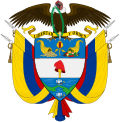| Name | Term | Acting President |
|---|
1. Santos Gutiérrez
2. Eustorgio Salgar
3. Juan José Nieto Gil | 14.05.1863 - 06.04.1864 | |
| Tomás Cipriano de Mosquera | 06.04.1864 - 20.03.1865 | |
1. José Hilario López
2. Santos Gutiérrez
3. Francisco Javier Zaldúa | 20.03.1865 - 17.02.1866 | |
1. José María Rojas Garrido
2. Santos Acosta
3. Marcelino Gutiérrez | 17.02.1866 - 10.02.1867 | 01.04.1866 - 20.05.1866 |
1. Santos Gutiérrez
2. Santos Acosta
3. José María Villamizar Gallardo (1867), Joaquín Riascos (1867-1868) | 10.02.1867 - 21.03.1868 | 23.05.1867 - 01.04.1868 |
1. Salvador Camacho
2. Eliseo Payán
3. Eustorgio Salgar | 21.03.1868 - 20.02.1869 | 21.12.1868 - 02.01.1869 |
1. Santiago Pérez de Manosalbas
2. Manuel Amador Fierro
3. Antonio María Pradilla | 20.02.1869 - 28.02.1870 | 22.06.1869 - 30.06.1869 |
1. Santos Gutiérrez
2. Julián Trujillo
3. Manuel Vengoechea | 28.02.1870 - 13.02.1871 | 01.09.1870 - 17.09.1870 |
1. Salvador Camacho
2. Manuel Amador Fierro
3. Apolinar Rueda | 13.02.1871 - 28.02.1872 | 11.07.1871 |
1. Eustorgio Salgar
2. Ezequiel Rojas
3. Buenaventura Correoso | 28.02.1872 - 15.02.1873 | |
1. Santiago Pérez de Manosalbas
2. Ramón Santodomingo Vila
3. Joaquín Riascos | 15.02.1873 - 25.02.1874 | |
1. Manuel Murillo Toro
2. Venancio Rueda
3. Emigdio Palau | 25.02.1874 - 15.02.1875 | |
1. Aquileo Parra
2. César Conto
3. José Ignacio Díaz-Granados Morales | 15.02.1875 - 28.02.1876 | |
1. Santiago Pérez de Manosalbas
2. Eliseo Neira
3. Joaquín Vengoechea | 28.02.1876 - 28.02.1877 | |
1. Julián Trujillo
2. Sergio Camargo Pinzón
3. Pablo Arosemena | 28.02.1877 - 24.02.1879 | 19.05.1877 - 13.08.1877 |
1. Felipe Pérez Manosalva
2. Gil Colunje
3. Ignacio José Manrique | 24.02.1879 - 08.03.1880 | |
1. Julián Trujillo
2. Francisco Javier Zaldúa
3. Pablo Arosemena | 08.03.1880 - 14.03.1881 | |
1. Julián Trujillo
2. Manuel Uribe Ángel
3. José María Campo Serrano | 14.03.1881 - 06.02.1882 | |
1. Rafael Núñez
2. José Eusebio Otalora
3. Eliseo Payán | 06.02.1882 - 07.02.1883 | 21.12.1882 - 07.02.1883 |
1. José Eusebio Otalora
2. Daniel Aldana
3. Ezequiel Hurtado | 07.02.1883 - 15.03.1884 | 07.02.1883 - 31.03.1884 |
1. Ezequiel Hurtado
2. José María Campo Serrano
3. Pedro J. Sarmiento | 15.03.1884 - 09.12.1885 | 01.04.1884 - 10.08.1884 |
| José María Campo Serrano | 09.12.1885 - 27.07.1888 | 01.04.1886 - 05.01.1887 |
| Carlos Holguín Mallarino | 27.07.1888 - 26.07.1890 | 07.08.1888 - 26.07.1888 |
| Carlos Holguín Mallarino | 26.07.1890 - 30.07.1892 | 26.07.1888 - 07.08.1892 |
| Leonardo Canal González | 30.07.1892 - 01.08.1894 | |
| Guillermo Quintero Calderón | 01.08.1894 - 01.08.1896 | 12.03.1896 - 17.03.1896 |
| Euclídes de Angulo | 14.03.1908 - 16.04.1908 | 14.03.1908 - 16.04.1908 |
| Jorge Holguín | 13.03.1909 - 25.09.1911 | 14.03.1909 - 07.06.1909 - 07.08.1909 |
1. Marco Fidel Suárez
2. José María González Valencia | 25.09.1911 - 11.08.1913 | |
1. Marco Fidel Suárez
2. Jorge Holguín | 11.08.1913 - 25.07.1918 | 07.08.1914 |
1. Pedro Nel Ospina
2. Pedro Antonio Molina | 25.07.1918 - 06.11.1921 | |
1. Jorge Holguín
2. Jorge Vélez | 06.11.1921 - 08.09.1922 | 11.11.1921 - 07.08.1922 |
1. José Joaquín Casas
2. Miguel Arroyo Díez | 08.09.1922 - 06.10.1927 | |
1. José Joaquín Casas
2. Ignacio Rengifo | 06.10.1927 - 05.11.1929 | |
1. Camilo C. Restrepo Callejas
2. Félix Cortés | 05.11.1929 - 10.07.1932 | |
1. Julián Uribe Gaviria
2. Román Gómez | 10.07.1932 - 02.10.1934 | |
1. Alberto Pumarejo
2. Francisco Samper Madrid | 02.10.1934 - 30.07.1937 | |
1. Gabriel Turbay
2. Carlos Lozano y Lozano | 30.07.1937 - 02.08.1938 | |
1. Gabriel Turbay
2. Tulio Tascón | 02.08.1938 - 10.08.1939 | |
1. Carlos Lozano y Lozano
2. Tulio Tascón | 10.08.1939 - 05.08.1943 | 09.10.1942 - 19.10.1942 |
1. Darío Echandía
2. Aníbal Badel | 05.08.1943 - 27.07.1945 | 19.11.1943 - 12.07.1944 |
1. Alberto Lleras Camargo
2. Ricardo Uribe Escobar | 27.07.1945 - 05.08.1946 | 07.08.1945 - 07.08.1946 |
| Carlos Arango Vélez | 05.08.1946 - 29.11.1946 | |
| Eduardo Santos Montejo | 29.11.1946 - 30.10.1951 | |
| Roberto Urdaneta Arbeláez | 30.10.1951 - 30.07.1955 | 05.11.1951 - 13.06.1953 |
| Gabriel París Gordillo | 30.07.1955 - 20.08.1958 | 30.07.1955 - 03.08.1955 |
| Darío Echandía | 20.08.1958 - 31.08.1960 | 02.04.1960 - 18.04.1960 |
| Carlos Lleras Restrepo | 31.08.1960 - 02.04.1963 | |
| José Antonio Montalvo | 02.04.1963 - 27.09.1967 | 06.08.1963 - 08.08.1963 |
| Julio César Turbay | 27.09.1967 - 06.12.1972 | |
| Rafael Azuero Manchola | 06.12.1972 - 04.09.1974 | 21.07.1973 - 24.07.1973 |
| Julio César Turbay | 04.09.1974 - 06.10.1976 | |
| Indalecio Liévano Aguirre | 06.10.1976 - 11.10.1978 | |
| Gustavo Balcázar Monzón | 11.10.1978 - 27.08.1980 | |
| Víctor Mosquera Chaux | 27.08.1980 - 24.08.1982 | 03.02.1981 - 11.02.1981 |
| Álvaro Gómez Hurtado | 24.08.1982 - 05.09.1984 | |
| Rodrigo Lloreda Caicedo | 05.09.1984 - 15.10.1986 | |
| Víctor Mosquera Chaux | 15.10.1986 - 22.08.1990 | |
| Luis Fernando Jaramillo | 22.08.1990 - 05.08.1992 | |
| Humberto de la Calle Lombana | 05.08.1992 - 11.08.1993 | |
| Juan Manuel Santos | 11.08.1993 - 07.08.1994 | |
